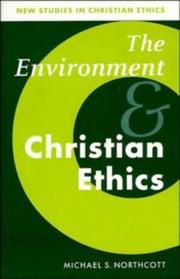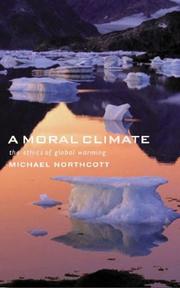| Listing 1 - 9 of 9 |
Sort by
|
Book
ISBN: 9780802870988 0802870988 1467439126 0281072337 Year: 2013 Publisher: Grand Rapids, Michigan ; Cambridge, England : William B. Eerdmans Publishing Company,
Abstract | Keywords | Export | Availability | Bookmark
 Loading...
Loading...Choose an application
- Reference Manager
- EndNote
- RefWorks (Direct export to RefWorks)
The failure of political institutions, including national governments and the United Nations, to mitigate climate change reflects the modern constitution of the nation-state as a cultural and secular, rather than created and providential, agency. Northcott constructs a new political theology of climate change that acknowledges the role of borders in the constitution of the nations, and their providential ordering under God as assemblies of persons who recognise particular duties to each other within those borders. Against this conception, a global economy promotes a state of conflict over acce
Global warming --- Climatic changes --- Geopolitics. --- Environmental ethics. --- Political aspects. --- Environmental ethics --- Geopolitics --- 241.65*7 --- Warming, Global --- Global temperature changes --- Greenhouse effect, Atmospheric --- World politics --- Environmental quality --- Human ecology --- Ethics --- 241.65*7 Theologische ethiek: natuur; ecologie --- Theologische ethiek: natuur; ecologie --- Political aspects --- Environmental aspects --- Moral and ethical aspects

ISBN: 0521444810 9780521576314 9780521444811 0521576318 0521576318 0511557477 Year: 1996 Publisher: Cambridge New York Melbourne Cambridge University Press
Abstract | Keywords | Export | Availability | Bookmark
 Loading...
Loading...Choose an application
- Reference Manager
- EndNote
- RefWorks (Direct export to RefWorks)
This book is about the extent, origins and causes of the environmental crisis. Dr Northcott argues that Christianity has lost the biblical awareness of the inter-connectedness of all life. He shows how Christian theologians and believers might recover a more ecologically friendly belief system and life style. The author provides an important corrective to secular approaches to environmental ethics, including utilitarian individualism, animal rights theories and deep ecology. He contends that neither the stewardship tradition, nor the panentheist or process ecological theologies have successfully mobilised the Christian tradition. He demonstrates that the Hebrew Bible contains an ecological message which is close to the traditions of many primal and indigenous peoples and which provides an important corrective to instrumental attitudes to nature in much modern philosophy and Christian ethics.Brings together philosophical and theological approaches to environmental ethicsNew anthropological reading of the Hebrew Bible, and relates to indigenous people and their life stylesArgues for an ecological revision of natural law ethics
241.65*7 --- 241.65*7 Theologische ethiek: natuur; ecologie --- Theologische ethiek: natuur; ecologie --- Arts and Humanities --- Religion --- Human ecology --- Religious aspects --- Christianity --- Christian ethics --- Environmental ethics --- Ecology --- Moral and ethical aspects
Book
ISBN: 9780511557477 9780521444811 9780521576314 Year: 1996 Publisher: Cambridge : Cambridge University Press,
Abstract | Keywords | Export | Availability | Bookmark
 Loading...
Loading...Choose an application
- Reference Manager
- EndNote
- RefWorks (Direct export to RefWorks)
This book is about the extent, origins and causes of the environmental crisis. Dr Northcott argues that Christianity has lost the biblical awareness of the inter-connectedness of all life. He shows how Christian theologians and believers might recover a more ecologically friendly belief system and life style. The author provides an important corrective to secular approaches to environmental ethics, including utilitarian individualism, animal rights theories and deep ecology. He contends that neither the stewardship tradition, nor the panentheist or process ecological theologies have successfully mobilised the Christian tradition. He demonstrates that the Hebrew Bible contains an ecological message which is close to the traditions of many primal and indigenous peoples and which provides an important corrective to instrumental attitudes to nature in much modern philosophy and Christian ethics.
Human ecology --- Christian ethics. --- Environmental ethics. --- Ecology --- Religious aspects --- Christianity. --- Moral and ethical aspects. --- Environmental quality --- Ethics --- Ethical theology --- Moral theology --- Theology, Ethical --- Theology, Moral --- Christian life --- Christian philosophy --- Religious ethics --- Moral and ethical aspects
Book
ISBN: 3631420358 Year: 1989 Volume: 61 Publisher: Frankfurt am Main,New York : P. Lang,
Abstract | Keywords | Export | Availability | Bookmark
 Loading...
Loading...Choose an application
- Reference Manager
- EndNote
- RefWorks (Direct export to RefWorks)
Book
ISBN: 9780367627744 0367627744 9780367627751 0367627752 9781003110750 Year: 2023 Publisher: Abingdon Routledge
Abstract | Keywords | Export | Availability | Bookmark
 Loading...
Loading...Choose an application
- Reference Manager
- EndNote
- RefWorks (Direct export to RefWorks)
God and Gaia explores the overlap between traditional religious cosmologies and the scientific Gaia theory of James Lovelock. It argues that a Gaian approach to the ecological crisis involves rebalancing human and more-than-human influences on Earth by reviving the ecological agency of local and indigenous human communities, and of nonhuman beings. Present-day human ecological influences on Earth have been growing at pace since the Scientific and Industrial Revolutions, when modern humans adopted a machine cosmology in which humans are the sole intelligent agency. The resultant imbalance between human and Earthly agencies is degrading the species diversity of ecosystems, causing local climate changes, and threatens to destabilise the Earth as a System. Across eight chapters this ambitious text engages with traditional cosmologies from the Indian Vedas and classical Greece to Medieval Christianity, with case material from Southeast Asia, Southern Africa and Great Britain. It discusses concepts such as deep time and ancestral time, the ethics of genetic engineering of foods and viruses, and holistic ecological management. Calling for an ontological turn that honours the differential agency of other beings and draws on sacred traditions, Northcott argues that it is possible to repair the destabilising impacts of contemporary human activities on the Earth System and its constituent ecosystems. This book will be of considerable interest to students and scholars of the environmental humanities, history, cultural and religious studies.
Human ecology --- Gaia hypothesis --- Religion and science --- Religious aspects

ISBN: 9781570757112 Year: 2007 Publisher: Maryknoll Orbis
Abstract | Keywords | Export | Availability | Bookmark
 Loading...
Loading...Choose an application
- Reference Manager
- EndNote
- RefWorks (Direct export to RefWorks)
Christian ethics --- Climatic changes --- Environmental ethics --- Environmental responsibility --- Global warming --- Human ecology --- Moral and ethical aspects --- Religious aspects --- Christianity
Book
ISBN: 1441114572 1441199640 1474217656 1441115374 9781441134066 1441134069 9781441199645 9781441115379 9781441114570 Year: 2015 Publisher: London
Abstract | Keywords | Export | Availability | Bookmark
 Loading...
Loading...Choose an application
- Reference Manager
- EndNote
- RefWorks (Direct export to RefWorks)
"People are born in one place. Traditionally humans move around more than other animals, but in modernity the global mobility of persons and the factors of production increasingly disrupts the sense of place that is an intrinsic part of the human experience of being on earth. Industrial development and fossil fuelled mobility negatively impact the sense of place and help to foster a culture of placelessness where buildings, fields and houses increasingly display a monotonous aesthetic. At the same time ecological habitats, and diverse communities of species are degraded. Romantic resistance to the industrial evisceration of place and ecological diversity involved the setting aside of scenic or sublime landscapes as wilderness areas or parks. However the implication of this project is that human dwelling and ecological sustainability are intrinsically at odds. In this collection of essays Michael Northcott argues that the sense of the sacred which emanates from local communities of faith sustained a 'parochial ecology' which, over the centuries, shaped communities that were more socially just and ecologically sustainable than the kinds of exchange relationships and settlement patterns fostered by a global and place-blind economy. Hence Christian communities in medieval Europe fostered the distributed use and intergenerational care of common resources, such as alpine meadows, forests or river catchments. But contemporary political economists neglect the role of boundaried places, and spatial limits, in the welfare of human and ecological communities. Northcott argues that place-based forms of community, dwelling and exchange such as a local food economy more closely resemble evolved commons governance arrangements, and facilitate the revival of a sense of neighbourhood, and of reconnection between persons and the ecological places in which they dwell."--Bloomsbury Publishing.
Community development. --- Human ecology. --- Place (Philosophy) --- Place attachment. --- Sustainable development. --- Social aspects. --- Place attachment --- Human ecology --- Sustainable development --- Community development --- Social aspects
Book
ISBN: 9780415742788 9780415742795 9781315768878 9781317667735 9781317667742 Year: 2014 Publisher: London Routledge
Abstract | Keywords | Export | Availability | Bookmark
 Loading...
Loading...Choose an application
- Reference Manager
- EndNote
- RefWorks (Direct export to RefWorks)
Christian moral theology --- Meteorology. Climatology --- Theology, Doctrinal --- 241.65*7 --- Ecotheology --- Climatic changes --- 241.65*7 Theologische ethiek: natuur; ecologie --- Theologische ethiek: natuur; ecologie --- Christian doctrines --- Christianity --- Doctrinal theology --- Doctrines, Christian --- Dogmatic theology --- Fundamental theology --- Systematic theology --- Theology, Dogmatic --- Theology, Systematic --- Theology --- Changes, Climatic --- Changes in climate --- Climate change --- Climate change science --- Climate changes --- Climate variations --- Climatic change --- Climatic fluctuations --- Climatic variations --- Global climate changes --- Global climatic changes --- Climatology --- Climate change mitigation --- Teleconnections (Climatology) --- Eco-theology --- Ecology --- Human ecology --- Doctrines --- Environmental aspects --- Religious aspects --- Global environmental change
Book
ISBN: 1606088211 1621890899 Year: 2010 Publisher: Wipf and Stock Publishers
Abstract | Keywords | Export | Availability | Bookmark
 Loading...
Loading...Choose an application
- Reference Manager
- EndNote
- RefWorks (Direct export to RefWorks)
| Listing 1 - 9 of 9 |
Sort by
|

 Search
Search Feedback
Feedback About UniCat
About UniCat  Help
Help News
News